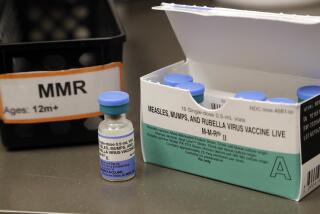Supervisors Demand Timely Health Reports
- Share via
Angry because they were kept in the dark for days about the hepatitis A threat posed to as many as 9,000 Los Angeles students and school employees, the Board of Supervisors on Tuesday ordered county health officials to inform them promptly about any future public health emergencies.
“I am outraged at the way this situation was handled,” said Board Chairman Zev Yaroslavsky, recounting how he learned of the hepatitis A threat in a phone call from Mayor Richard Riordan rather than from county health officials.
“This is nuts, the way this thing happened,” he said.
Remembering that he had once been notified by phone about a sick elephant at the Los Angeles Zoo, Yaroslavsky said he didn’t learn about the frozen desserts containing possibly tainted strawberries until shortly before the Los Angeles Unified School District was to hold a news conference about the threat.
“We got a call on the elephant, but we didn’t get a call on the hepatitis affecting 9,000 kids in our public schools,” said Yaroslavsky. “The only suckers who didn’t know about the rumor were the five of us.”
Supervisors Gloria Molina, Yvonne Brathwaite Burke and Don Knabe joined in voicing their displeasure at not being informed about the hepatitis danger and plans to inoculate students and staff at schools where the fruit was consumed.
“When something happens, let us know,” Knabe said.
County Health Services Director Mark Finucane, who also learned late that hisdepartment had been working on the hepatitis problem for days, promised the supervisors that he would develop a communication policy with “a heavy dose of common sense.”
Two children among those served possibly contaminated strawberries were being kept home from school this week after exhibiting mild flu-like symptoms that could be indicative of the onset of hepatitis, the school district said Tuesday.
However, Dr. Shirley Fannin, Los Angeles County’s director of infectious disease control, said she doubted that the children have the highly contagious illness.
“I would be very surprised if this is the onset of hepatitis,” she said. “The normal incubation period is three to six weeks, and these children were exposed less than two weeks ago.”
For anyone to develop the disease after such a short incubation period would be “very, very unusual,” Fannin said. “There are a lot of other illnesses with mild flu-like symptoms.”
Dr. Helen DuPlessis, director of the district’s medical services department, said that if the two children have contracted hepatitis, the health risk to them is minimal. But they could pose a threat of infection to adults, who can suffer more serious effects from the highly contagious disease, she said.
Tests to determine whether the two children actually have hepatitis A will be completed this week, DuPlessis said. The identities of the children and their schools have not been made public.
On Tuesday, health officials trying to head off an outbreak of the disease completed their emergency campaign to inoculate all children who might have been exposed, although there may be spot inoculations later in the week for more than 100 children who missed the shots.
Four-ounce frozen strawberry-blueberry fruit cups were served March 25-28 at 18 schools. The two children are believed to have eaten the desserts March 26.
The strawberries in the desserts have been implicated in three hepatitis A outbreaks in Michigan.
All the strawberries were grown and frozen in Mexico before shipment to Andrew & Williamson, a processor and packer of foods in San Diego. The frozen fruit was shipped to Southern California, Michigan, Arizona, Georgia and Florida as part of a school lunch program sponsored by the federal Department of Agriculture.
A federal investigation is planned because the department is legally required to buy only U.S.-grown produce for the school lunch program. Offenders face prison terms of up to five years.
More to Read
Sign up for Essential California
The most important California stories and recommendations in your inbox every morning.
You may occasionally receive promotional content from the Los Angeles Times.













